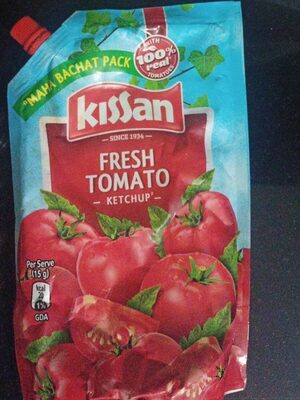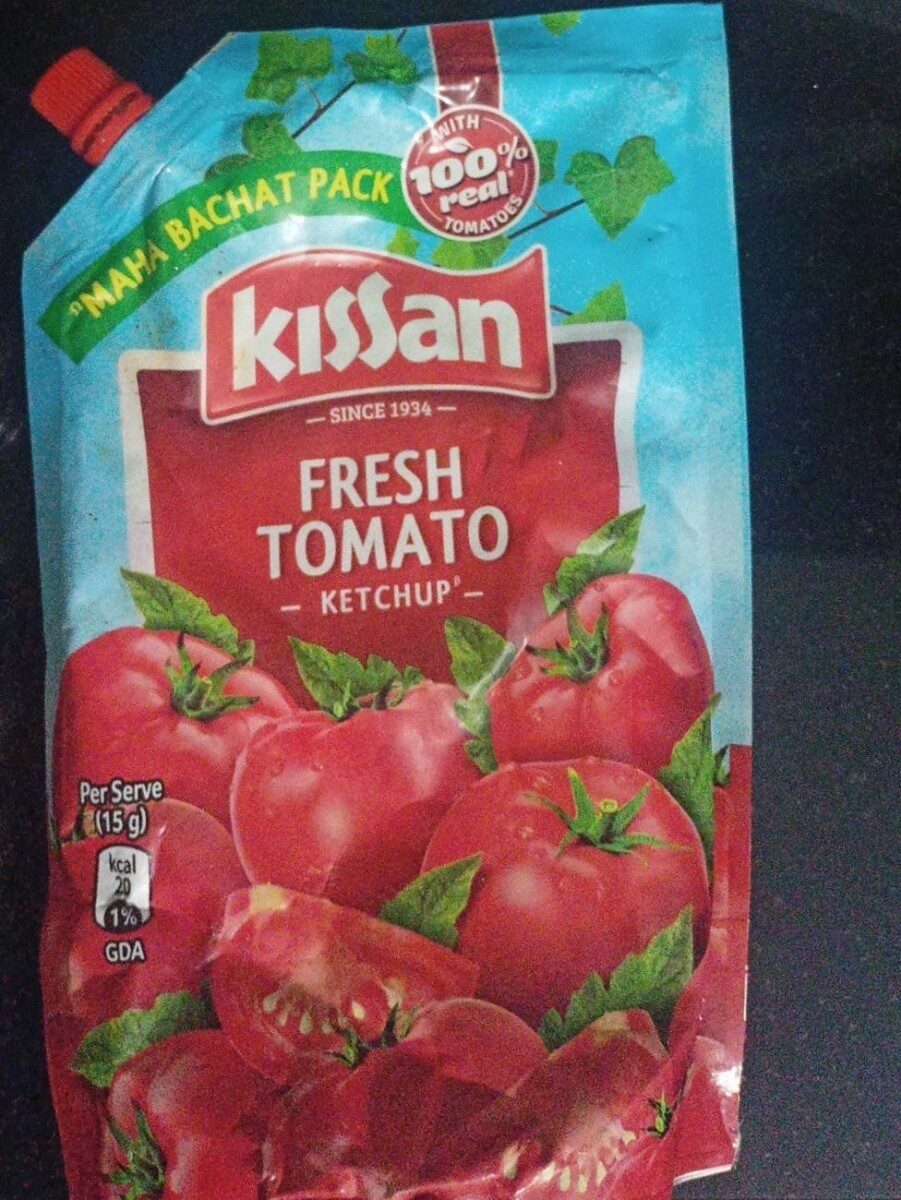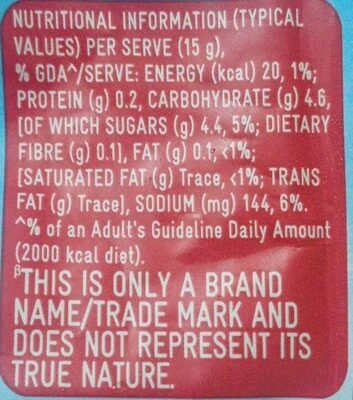Help us make food transparency the norm!
As a non-profit organization, we depend on your donations to continue informing consumers around the world about what they eat.
The food revolution starts with you!
Fresh Tomato Ketchup - Kissan - 950 g
Fresh Tomato Ketchup - Kissan - 950 g
This product page is not complete. You can help to complete it by editing it and adding more data from the photos we have, or by taking more photos using the app for Android or iPhone/iPad. Thank you!
×
Barcode: 8901030667756 (EAN / EAN-13)
Common name: Ketchup
Quantity: 950 g
Packaging: Pouch flask
Brands: Kissan
Categories: Condiments, Sauces, Tomato sauces, Ketchup, Tomato Ketchup, Groceries
Labels, certifications, awards:
Vegetarian, Green Dot India
Origin of ingredients: India
Manufacturing or processing places: India
Countries where sold: India
Matching with your preferences
Health
Ingredients
-
15 ingredients
WATER, TOMATO PASTE (28%), SUGAR, IODISED SALT, ACIDITY REGULATOR - 260, STABILISERS - 1422, 415, PRESERVATIVES - 211, ONION POWDER, GARLIC POWDER, SPICES AND CONDIMENTS.Traces: Saturated-fat
Food processing
-
Ultra processed foods
Elements that indicate the product is in the 4 - Ultra processed food and drink products group:
- Additive: E1422 - Acetylated distarch adipate
- Additive: E415 - Xanthan gum
Food products are classified into 4 groups according to their degree of processing:
- Unprocessed or minimally processed foods
- Processed culinary ingredients
- Processed foods
- Ultra processed foods
The determination of the group is based on the category of the product and on the ingredients it contains.
Additives
-
E1422 - Acetylated distarch adipate
Acetylated distarch adipate: Acetylated distarch adipate -E1422-, is a starch that is treated with acetic anhydride and adipic acid anhydride to resist high temperatures. It is used in foods as a bulking agent, stabilizer and a thickener. No acceptable daily intake for human consumption has been determined.Source: Wikipedia
-
E211 - Sodium benzoate
Sodium benzoate: Sodium benzoate is a substance which has the chemical formula NaC7H5O2. It is a widely used food preservative, with an E number of E211. It is the sodium salt of benzoic acid and exists in this form when dissolved in water. It can be produced by reacting sodium hydroxide with benzoic acid.Source: Wikipedia
-
E260 - Acetic acid
Acetic acid: Acetic acid , systematically named ethanoic acid , is a colorless liquid organic compound with the chemical formula CH3COOH -also written as CH3CO2H or C2H4O2-. When undiluted, it is sometimes called glacial acetic acid. Vinegar is no less than 4% acetic acid by volume, making acetic acid the main component of vinegar apart from water. Acetic acid has a distinctive sour taste and pungent smell. In addition to household vinegar, it is mainly produced as a precursor to polyvinyl acetate and cellulose acetate. It is classified as a weak acid since it only partially dissociates in solution, but concentrated acetic acid is corrosive and can attack the skin. Acetic acid is the second simplest carboxylic acid -after formic acid-. It consists of a methyl group attached to a carboxyl group. It is an important chemical reagent and industrial chemical, used primarily in the production of cellulose acetate for photographic film, polyvinyl acetate for wood glue, and synthetic fibres and fabrics. In households, diluted acetic acid is often used in descaling agents. In the food industry, acetic acid is controlled by the food additive code E260 as an acidity regulator and as a condiment. In biochemistry, the acetyl group, derived from acetic acid, is fundamental to all forms of life. When bound to coenzyme A, it is central to the metabolism of carbohydrates and fats. The global demand for acetic acid is about 6.5 million metric tons per year -Mt/a-, of which approximately 1.5 Mt/a is met by recycling; the remainder is manufactured from methanol. Vinegar is mostly dilute acetic acid, often produced by fermentation and subsequent oxidation of ethanol.Source: Wikipedia
-
E415 - Xanthan gum
Xanthan gum (E415) is a natural polysaccharide derived from fermented sugars, often used in the food industry as a thickening and stabilizing agent.
This versatile food additive enhances texture and prevents ingredient separation in a wide range of products, including salad dressings, sauces, and gluten-free baked goods.
It is considered safe for consumption even at high intake amounts.
Ingredients analysis
-
Palm oil free
No ingredients containing palm oil detected
Unrecognized ingredients: 260, 1422, 415, 211Some ingredients could not be recognized.
We need your help!
You can help us recognize more ingredients and better analyze the list of ingredients for this product and others:
- Edit this product page to correct spelling mistakes in the ingredients list, and/or to remove ingredients in other languages and sentences that are not related to the ingredients.
- Add new entries, synonyms or translations to our multilingual lists of ingredients, ingredient processing methods, and labels.
If you would like to help, join the #ingredients channel on our Slack discussion space and/or learn about ingredients analysis on our wiki. Thank you!
-
Vegan status unknown
Unrecognized ingredients: 260, 1422, 415, 211Some ingredients could not be recognized.
We need your help!
You can help us recognize more ingredients and better analyze the list of ingredients for this product and others:
- Edit this product page to correct spelling mistakes in the ingredients list, and/or to remove ingredients in other languages and sentences that are not related to the ingredients.
- Add new entries, synonyms or translations to our multilingual lists of ingredients, ingredient processing methods, and labels.
If you would like to help, join the #ingredients channel on our Slack discussion space and/or learn about ingredients analysis on our wiki. Thank you!
-
Vegetarian
No non-vegetarian ingredients detected
Unrecognized ingredients: 260, 1422, 415, 211Some ingredients could not be recognized.
We need your help!
You can help us recognize more ingredients and better analyze the list of ingredients for this product and others:
- Edit this product page to correct spelling mistakes in the ingredients list, and/or to remove ingredients in other languages and sentences that are not related to the ingredients.
- Add new entries, synonyms or translations to our multilingual lists of ingredients, ingredient processing methods, and labels.
If you would like to help, join the #ingredients channel on our Slack discussion space and/or learn about ingredients analysis on our wiki. Thank you!
-
Details of the analysis of the ingredients
We need your help!
Some ingredients could not be recognized.
We need your help!
You can help us recognize more ingredients and better analyze the list of ingredients for this product and others:
- Edit this product page to correct spelling mistakes in the ingredients list, and/or to remove ingredients in other languages and sentences that are not related to the ingredients.
- Add new entries, synonyms or translations to our multilingual lists of ingredients, ingredient processing methods, and labels.
If you would like to help, join the #ingredients channel on our Slack discussion space and/or learn about ingredients analysis on our wiki. Thank you!
: WATER, TOMATO PASTE 28%, SUGAR, IODISED SALT, ACIDITY REGULATOR, 260, STABILISERS, 1422, 415, PRESERVATIVES, 211, ONION, GARLIC, SPICES, CONDIMENTS- WATER -> en:water - vegan: yes - vegetarian: yes - ciqual_food_code: 18066 - percent_min: 28 - percent_max: 72
- TOMATO PASTE -> en:tomato-concentrate - vegan: yes - vegetarian: yes - ciqual_food_code: 20068 - percent_min: 28 - percent: 28 - percent_max: 28
- SUGAR -> en:sugar - vegan: yes - vegetarian: yes - ciqual_proxy_food_code: 31016 - percent_min: 0 - percent_max: 28
- IODISED SALT -> en:iodised-salt - vegan: yes - vegetarian: yes - ciqual_food_code: 11058 - percent_min: 0 - percent_max: 2.4
- ACIDITY REGULATOR -> en:acidity-regulator - percent_min: 0 - percent_max: 2.4
- 260 -> en:260 - percent_min: 0 - percent_max: 2.4
- STABILISERS -> en:stabiliser - percent_min: 0 - percent_max: 2.4
- 1422 -> en:1422 - percent_min: 0 - percent_max: 2.4
- 415 -> en:415 - percent_min: 0 - percent_max: 2.4
- PRESERVATIVES -> en:preservative - percent_min: 0 - percent_max: 2.4
- 211 -> en:211 - percent_min: 0 - percent_max: 2.4
- ONION -> en:onion - vegan: yes - vegetarian: yes - ciqual_food_code: 20034 - percent_min: 0 - percent_max: 2.4
- GARLIC -> en:garlic - vegan: yes - vegetarian: yes - ciqual_food_code: 11000 - percent_min: 0 - percent_max: 2.4
- SPICES -> en:spice - vegan: yes - vegetarian: yes - percent_min: 0 - percent_max: 2.4
- CONDIMENTS -> en:condiment - vegan: maybe - vegetarian: maybe - percent_min: 0 - percent_max: 2.4
Nutrition
-
Poor nutritional quality
⚠ ️Warning: the amount of fruits, vegetables and nuts is not specified on the label, it was estimated from the list of ingredients: 28This product is not considered a beverage for the calculation of the Nutri-Score.
Positive points: 0
- Proteins: 0 / 5 (value: 1.33, rounded value: 1.33)
- Fiber: 0 / 5 (value: 0.667, rounded value: 0.67)
- Fruits, vegetables, nuts, and colza/walnut/olive oils: 0 / 5 (value: 28, rounded value: 28)
Negative points: 17
- Energy: 1 / 10 (value: 560, rounded value: 560)
- Sugars: 6 / 10 (value: 29.3, rounded value: 29.3)
- Saturated fat: 0 / 10 (value: 0, rounded value: 0)
- Sodium: 10 / 10 (value: 960, rounded value: 960)
The points for proteins are not counted because the negative points are greater or equal to 11.
Nutritional score: (17 - 0)
Nutri-Score:
-
Nutrient levels
-
Fat in low quantity (0.667%)
What you need to know- A high consumption of fat, especially saturated fats, can raise cholesterol, which increases the risk of heart diseases.
Recommendation: Limit the consumption of fat and saturated fat- Choose products with lower fat and saturated fat content.
-
Saturated fat in low quantity (0%)
What you need to know- A high consumption of fat, especially saturated fats, can raise cholesterol, which increases the risk of heart diseases.
Recommendation: Limit the consumption of fat and saturated fat- Choose products with lower fat and saturated fat content.
-
Sugars in high quantity (29.3%)
What you need to know- A high consumption of sugar can cause weight gain and tooth decay. It also augments the risk of type 2 diabetes and cardio-vascular diseases.
Recommendation: Limit the consumption of sugar and sugary drinks- Sugary drinks (such as sodas, fruit beverages, and fruit juices and nectars) should be limited as much as possible (no more than 1 glass a day).
- Choose products with lower sugar content and reduce the consumption of products with added sugars.
-
Salt in high quantity (2.4%)
What you need to know- A high consumption of salt (or sodium) can cause raised blood pressure, which can increase the risk of heart disease and stroke.
- Many people who have high blood pressure do not know it, as there are often no symptoms.
- Most people consume too much salt (on average 9 to 12 grams per day), around twice the recommended maximum level of intake.
Recommendation: Limit the consumption of salt and salted food- Reduce the quantity of salt used when cooking, and don't salt again at the table.
- Limit the consumption of salty snacks and choose products with lower salt content.
-
-
Nutrition facts
Nutrition facts As sold
for 100 g / 100 mlAs sold
per serving (15g)Compared to: Tomato Ketchup Energy 560 kj
(133 kcal)84 kj
(20 kcal)+14% Fat 0.667 g 0.1 g +202% Saturated fat ~ 0 g ~ 0 g -100% Trans fat ~ 0 g ~ 0 g Carbohydrates 30.7 g 4.6 g +10% Sugars 29.3 g 4.4 g +28% Fiber 0.667 g 0.1 g Proteins 1.33 g 0.2 g +30% Salt 2.4 g 0.36 g +11% Fruits‚ vegetables‚ nuts and rapeseed‚ walnut and olive oils (estimate from ingredients list analysis) 28 % 28 %
Environment
-
Eco-Score B - Low environmental impact
⚠ ️The full impact of transportation to your country is currently unknown.The Eco-Score is an experimental score that summarizes the environmental impacts of food products.→ The Eco-Score was initially developped for France and it is being extended to other European countries. The Eco-Score formula is subject to change as it is regularly improved to make it more precise and better suited to each country.Life cycle analysis
-
Average impact of products of the same category: A (Score: 94/100)
Category: Ketchup
Category: Ketchup
- PEF environmental score: 0.15 (the lower the score, the lower the impact)
- including impact on climate change: 0.95 kg CO2 eq/kg of product
Stage Impact Agriculture
35.6 %Processing
25.5 %Packaging
16.9 %Transportation
14.0 %Distribution
6.3 %Consumption
1.7 %
Bonuses and maluses
-
Origins of ingredients with a high impact
Malus:
Environmental policy: -5
Transportation: 0
Origin of the product and/or its ingredients % of ingredients Impact India 100 %High
-
Packaging with a medium impact
Malus: -10
Shape Material Recycling Impact Pouch flask Unknown High ⚠ ️ The information about the packaging of this product is not sufficiently precise (exact shapes and materials of all components of the packaging).⚠ ️ For a more precise calculation of the Eco-Score, you can modify the product page and add them.
If you are the manufacturer of this product, you can send us the information with our free platform for producers.
Eco-Score for this product
-
Impact for this product: B (Score: 79/100)
Product: Fresh Tomato Ketchup - Kissan - 950 g
Life cycle analysis score: 94
Sum of bonuses and maluses: -10
Final score: 79/100
-
Carbon footprint
-
Equal to driving 0.5 km in a petrol car
95 g CO² per 100g of product
The carbon emission figure comes from ADEME's Agribalyse database, for the category: Ketchup (Source: ADEME Agribalyse Database)
Stage Impact Agriculture
22.9 %Processing
21.3 %Packaging
23.9 %Transportation
26.9 %Distribution
4.2 %Consumption
0.7 %
Packaging
-
Packaging with a medium impact
-
Packaging parts
Pouch flask
-
Packaging materials
Material % Packaging weight Packaging weight per 100 g of product
-
Transportation
-
Origins of ingredients
Origins of ingredients with a high impact
Origin of the product and/or its ingredients % of ingredients Impact India 100 %High
Report a problem
-
Incomplete or incorrect information?
Category, labels, ingredients, allergens, nutritional information, photos etc.
If the information does not match the information on the packaging, please complete or correct it. Open Food Facts is a collaborative database, and every contribution is useful for all.
Data sources
Product added on by openfoodfacts-contributors
Last edit of product page on by mudskipper875.
Product page also edited by chunkieramos, ecoscore-impact-estimator, invokeandy, kiliweb, off.9315b485-6747-4c09-a254-1bf1ee515059, off.ba0e5a7f-88a9-404c-a51d-bb3deedc87c7, packbot, yuka.sY2b0xO6T85zoF3NwEKvlkJVcdHihAjOFyT5hBSQ6e2EAq2xboFS_qP0I6g.










